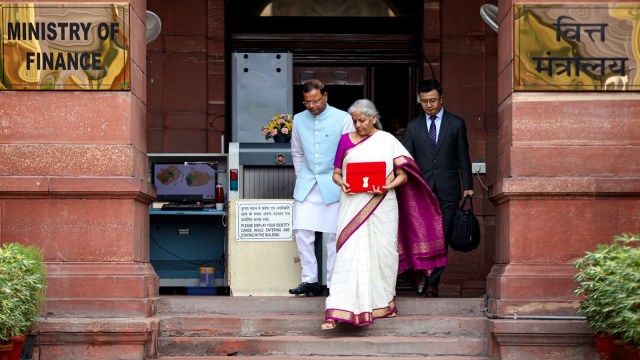Finance Minister Nirmala Sitharaman, in her Budget speech Tuesday, proposed a new assessment model for credit to Micro, Small and Medium Enterprises (MSMEs) that requires public sector banks (PSBs) to assess credit eligibility themselves instead of relying on external assessment.
She also proposed to increase the limit of Mudra loans from Rs 10 lakh to Rs 20 lakh and introduce a credit guarantee scheme for purchase of machinery and equipment without collateral or third party guarantee.

“[PSBs] will also take a lead in developing or getting developed a new credit assessment model, based on the scoring of digital footprints of MSMEs in the economy. This is expected to be a significant improvement over the traditional assessment of credit eligibility based only on asset or turnover criteria. That will also cover MSMEs without a formal accounting system,” she said.
The credit guarantee scheme for purchase of machinery and equipment without collateral will operate on pooling of credit risks of MSMEs seeking to benefit from the scheme, Sitharaman said. “A separately constituted self financing guarantee fund will provide to each applicant guarantee cover up to 100 crore rupees. While the loan amount may be larger, the borrower will have to provide an upfront guarantee fee and an annual guarantee fee on the reducing loan balance,” she said.
In a press release, the Federation of Indian Micro Small & Medium Enterprises (FISME) said: “Instead of going through a complicated project assessment process, businesses can now seek loans under the scheme to buy machinery without any collateral or third-party guarantee. This will significantly boost technology upgradation.”
ExplainedBased on digital footprint
Under the new assessment system, PSBs will have to assess credit based on MSMEs’ digital footprint. It is expected to be a significant improvement over the traditional system, based on asset or turnover, and will also cover MSMEs that do not have a formal accounting system.
FISME added that the move to ask banks to develop their own risk assessment models was a demand it had raised with the Ministry of Finance. “This will end the expenses and harassment MSMEs faced at the hands of rating agencies,” it said.
Sitharaman also increased the turnover threshold of buyers for mandatory onboarding on the TReDS platform from Rs 500 crore to Rs 250 crore. TReDS is an online platform that allows MSMEs to unlock working capital by converting their trade receivables from buyers into cash.
Story continues below this ad
“This measure will bring 22 more CPSEs and 7,000 more companies onto the platform. Medium enterprises will also be included in the scope of the suppliers,” Sitharaman said in her speech.
Vinod Kumar, president of India SME Forum, said: “Doing away with external credit ratings, the reduction of the turnover threshold to enterprises with a turnover over Rs 250 crore for mandatory onboarding on the TReDS platform… will significantly improve liquidity for smaller enterprises and unlock working capital more efficiently.”
Sitharaman also announced that the loan limit under PM Mudra Yojana will be enhanced to Rs 20 lakh from Rs 10 lakh for those entrepreneurs who have availed and successfully repaid previous loans under the ‘Tarun’ category.
The flagship scheme of the MSME Ministry was launched in 2015 to facilitate easy collateral-free micro-credit to non-corporate, non-farm small and micro-entrepreneurs for income-generating activities.
Story continues below this ad
To further improve access to credit, Sitharaman said SIDBI will open new branches to serve all major MSME clusters within 3 years, including 24 branches this year, which will expand coverage to 168 out of 242 major clusters.
Notably, the estimated budgetary allocation of Rs 22,138 crore to the MSME Ministry for 2024-25 is the same as the revised estimate for the previous financial year.

































